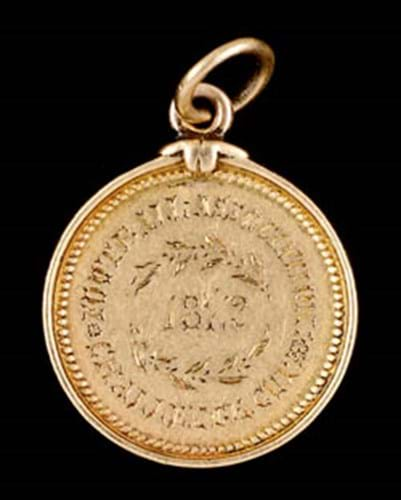
While the George Best medal beat its £90,000-120,000 estimate and was the highlight of the sale at Bonhams Chester on October 20, next month Graham Budd Auctions (in association with Sotheby's) will sell two market 'firsts' - gold medals for the inaugural Association Challenge Cup final of 1872 and the first official Test Match in cricket history.
Both are unrecorded and both have emerged via connections in the jewellery trade.
The F.A. Cup, the world's oldest competition in association football, was first proposed by the influential sportsman and administrator Charles William Alcock (1842-1907), an old Harrovian who was secretary of the Football Association for 25 years from 1870-95. His landmark idea, based on his experience of inter-house 'sudden death' sporting competitions played at Harrow School, was first embraced by 15 teams including Wanderers FC, comprising mostly Old Harrovians and pupils from other public schools, of which Alcock happened to be captain. Fittingly for him, the team progressed to the final that was played against the Royal Engineers on March 16, 1872 at the Kennington Oval before a crowd of 2000. A goal by Wanderers' Morton Betts after 15 minutes proved to be the decisive score.
The silver F.A. Cup trophy was first presented to Wanderers FC on April 11 at their annual dinner at the Pall Mall Restaurant, Charing Cross, when the triumphant players were also given medals, the example offered here (hallmarked for William Joseph Taylor of London) being the only known survival.
The identity of the recipient has been lost over the passage of time. The vendor's grandfather was the proprietor of a jewellery shop in the Seven Sisters Road in North London and bought the medal as part of a consignment of scrap gold from house clearers in the 1950s. A keen football fan, he recognised the importance of the medal which saved it from the melting pot. Grandfather's 1872 F.A. Cup winner's medal then became a cherished family heirloom which on November 8-9 carries an estimate of £30,000-50,000.
A more recent discovery within the trade is a medal presented to the English cricketer Harry Charlwood on the occasion of the first ever official Test Match that commenced on March 15, 1877 at the Melbourne Cricket Ground. Australia won the game by 45 runs, a result that, extraordinarily, was duplicated precisely when Australia and England competed in the centenary match, played at the MCG a century later.
The medal was presented by George Browne, a Melbourne architect who designed the first permanent grandstand built at the MCG for the 1877 series. Presumably a gold medal was given to every visiting England player, and perhaps the home team too, but this is the only known extant example. It is engraved to the Sussex right-hand bat Henry Rupert James Charlwood (1846-1888) who played at No.3 scoring 36 in the first innings and 13 in the second innings. The 14 and a duck he scored in the following match (a four-wicket victory for England) were his only other runs in Test cricket. The medal is estimated at £10,000-20,000.
If a possible contender for that prize will be the Marylebone Cricket Club, then they too are raising funds with an auction of 100 lots at Christie's South Kensington on November 17. Following advice from the Arts & Library Committee, the MCC Committee has authorised the sale of a number of duplicate items from the collections. The majority of items will come from the MCC Library collection. The proceeds will provide MCC with funds required to enhance and conserve the core collection at Lord's.
The first independent works on cricket ever published were verse accounts of cricket matches, mock heroic poems in the genre established by Alexander Pope's Rape of the Lock (1714). Highlights of the MCC duplicate sale include not only the first of these humorous poems, James Dance's Cricket. An Heroic Poem, London [1744] (estimate £10,000-15,000), but also three other rare cricket poems which appeared as 18th century pamphlets.
John Duncombe's Surry [sic] Triumphant and John Burnby's Kentish Cricketers were both written by clergymen and both published in 1773, and MCC are offering a magnificent volume, in which these two poems are bound together (estimate £18,000-25,000).
A complete run of Wisden's in MCC boards will excite collectors as will 1792, 1793 and 1796 editions of the rare scorebooks produced by Samuel Britcher, an official scorer for Marylebone Cricket Club, and the first person to produce an annual scorebook on a regular basis.
William Epps's Cricket. A Collection of All the Grand Matches played in England from 1771 to 1791, published in Rochester, Kent, in 1799 was intended to supplement the publications of Britcher which ran from 1790 to 1805. Considered by many as the most important historical publication on cricket in the late 18th century, this is estimated at £50,000-70,000.
By Roland Arkell




